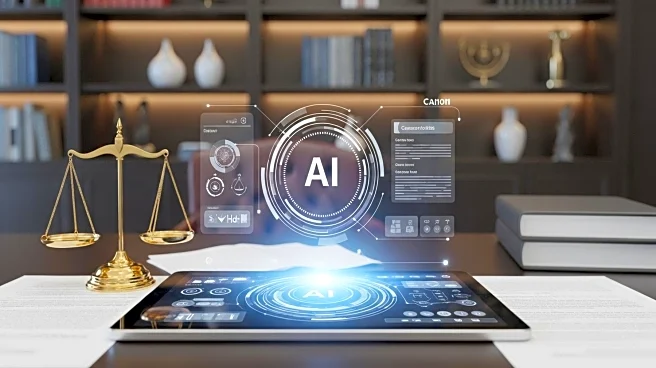What is the story about?
What's Happening?
Artificial intelligence is reshaping the legal profession by offering new opportunities for junior lawyers to engage in strategic roles rather than traditional document review tasks. AI strategist Sol Rashidi highlights the importance of collaboration and mentorship in integrating AI into legal practice. AI tools can enhance efficiency and broaden access to information, but they also require rigorous validation to prevent inaccuracies. The technology allows junior lawyers to extract insights from large data sets, transforming their roles into 'insight archaeologists' who can identify strategic angles and patterns. This shift is supported by prompt engineering, which enables lawyers to synthesize information across domains and generate strategic frameworks.
Why It's Important?
The integration of AI in legal practice has significant implications for the industry, potentially reducing costs and expanding the reach of legal teams. Junior lawyers can leverage AI to enhance their strategic thinking and contribute more effectively to legal teams. However, the use of AI must be balanced with traditional legal rigor to ensure accuracy and maintain professional standards. The development of AI capabilities among junior lawyers can differentiate them in hiring processes, making prompt engineering a valuable skill. This transformation could redefine the roles within legal teams, emphasizing the importance of mentorship and collaboration between junior and senior lawyers.
What's Next?
Legal teams are expected to continue experimenting with AI tools, integrating them into practice while maintaining rigorous validation processes. The focus will be on developing a team culture that combines the experience of senior lawyers with the tech fluency of junior lawyers. As AI capabilities evolve, legal departments may need to adapt their strategies to harness AI's potential while ensuring it complements human judgment. The ongoing development of AI tools will likely lead to further changes in legal practice, requiring continuous adaptation and training.
Beyond the Headlines
The ethical implications of AI in legal practice include the risk of AI-generated inaccuracies and the need for structured skepticism. Legal teams must navigate the balance between innovation and maintaining professional standards. The cultural transformation within legal teams will require open-minded leadership to drive AI adoption and address resistance. AI's role in legal practice may also influence the external legal services market, potentially altering competitive dynamics and impacting mid-market firms.

















